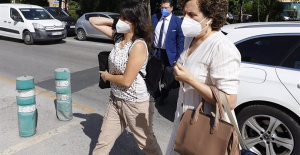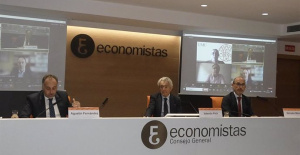He agrees with the son against the defendant's argument that the matter was already tried in 1987
MADRID, 2 Dic. (EUROPA PRESS) -
The Supreme Court has determined that a paternity case that was dismissed 35 years ago must be studied. On that occasion, the mother's request was denied as it was not possible to prove who the father was - despite the fact that the biological test gave a 99.3% probability - on the grounds that she, "due to her profession", she had been able to "have more relationships with other men."
Now, the magistrates have recognized the right of the child in question to clarify whether that man, whose paternity was "extremely probable", is his biological father or not. They have stressed that the interest that children have in knowing and finding out who their father is "fits into the effective judicial protection that must be granted to them" and "it is even necessary for genetic determination and may be vital to preserve health".
Thus, in a judgment to which Europa Press has had access, the Civil Chamber has concluded that the child's right to demand that his or her parent be clarified should prevail over the principle of legal certainty alleged by the alleged father, that He says that the matter is already res judicata. Therefore, the court has sent the case back to the Provincial Court of Granada.
The case has its origin in the lawsuit that a man filed against his mother and against what he believes is his father to get the courts to declare that he is the biological son of both and order it to be recorded in the Civil Registry.
The plaintiff, who was born in Andalusia in 1986, assured that it was "the result of an extramarital relationship" between his mother and the man he is suing. He alleged that his mother, when he was 18 years old, legally demanded from said man that she acknowledge the paternity and alimony of the then minor.
According to the sentence, on that occasion the corresponding court performed a biological test that concluded that "the probability of paternity was 99.3%." However, the test was said to yield "mere probability", "insufficient and inconclusive".
In addition, although the man also acknowledged having had "at least one sexual relationship" with the woman, the case was dismissed because paternity could not be proven because she, "due to her profession," had been able to "have more relationships with other men." .
Now, the son in question has taken the case personally before the Justice. The alleged father asked the courts not to enter into the matter because, in his opinion, it was already judged and he refused to carry out a new biological test. The lower courts agreed with the man, but the young man has appealed until he reached the Supreme Court.
In 22 pages, the High Court has recalled that "in this kind of process, material truth, biological reality and natural law must prevail." In this sense, it has indicated that the Civil Code provides that "final judgments on filiation will not prevent the action that is based on evidence or facts only provided for by the new legislation from being brought again."
In line, the magistrates have stressed that the European Court of Human Rights (ECHR) recognized in 2014 the right to review a final sentence based on respect for the family life of any person whose parentage is reviewed to find out the biological truth.
In the resolution, for which magistrate José Luis Seoane was the speaker, the Supreme Court explained that the first time a lawsuit was filed to clarify the issue of paternity was when the child in question was a newborn. And he specified that at the time, the 18-year-old mother "lacked her own resources to litigate, for which she accepted the benefits of free justice."
The court has stressed that although the mother appealed the filing of the lawsuit, "for reasons that are unknown, the appeal was not formalized", something that, according to what they have indicated, "caused the minor to suffer an injury in his best interests". .
The magistrates recalled that the New York Convention on the Rights of the Child recognizes the right of minors to "know their parents and be cared for by them."

 Exploring Cardano: Inner Workings and Advantages of this Cryptocurrency
Exploring Cardano: Inner Workings and Advantages of this Cryptocurrency Seville.- Economy.- Innova.- STSA inaugurates its new painting and sealing hangar in San Pablo, for 18 million
Seville.- Economy.- Innova.- STSA inaugurates its new painting and sealing hangar in San Pablo, for 18 million Innova.- More than 300 volunteers join the Andalucía Compromiso Digital network in one month to facilitate access to ICT
Innova.- More than 300 volunteers join the Andalucía Compromiso Digital network in one month to facilitate access to ICT Innova.-AMP.- Ayesa acquires 51% of Sadiel, which will create new technological engineering products and expand markets
Innova.-AMP.- Ayesa acquires 51% of Sadiel, which will create new technological engineering products and expand markets Juana Rivas's legal team manages to repeat the trial "that separated the brothers" in Italy
Juana Rivas's legal team manages to repeat the trial "that separated the brothers" in Italy The New York Justice annuls Harvey Weinstein's conviction for sexual crimes and orders a new trial
The New York Justice annuls Harvey Weinstein's conviction for sexual crimes and orders a new trial Socialist militants promote a large demonstration in support of Sánchez on Saturday in Ferraz
Socialist militants promote a large demonstration in support of Sánchez on Saturday in Ferraz Families with average income allocate a third of their income to paying taxes, according to economists
Families with average income allocate a third of their income to paying taxes, according to economists How Blockchain in being used to shape the future
How Blockchain in being used to shape the future Not just BTC and ETH: Here Are Some More Interesting Coins Worth Focusing on
Not just BTC and ETH: Here Are Some More Interesting Coins Worth Focusing on Retrópolis brings the golden age of video games and computing to the UPV
Retrópolis brings the golden age of video games and computing to the UPV Looking for video games that value the neighborhoods of Valencia
Looking for video games that value the neighborhoods of Valencia UPV researchers improve the efficiency of air conditioning systems using a geothermal heat pump
UPV researchers improve the efficiency of air conditioning systems using a geothermal heat pump València is committed to citiverse and smart tourism to be "the reference technological hub of the Mediterranean"
València is committed to citiverse and smart tourism to be "the reference technological hub of the Mediterranean" A million people demonstrate in France against Macron's pension reform
A million people demonstrate in France against Macron's pension reform Russia launches several missiles against "critical infrastructure" in the city of Zaporizhia
Russia launches several missiles against "critical infrastructure" in the city of Zaporizhia A "procession" remembers the dead of the Calabria shipwreck as bodies continue to wash up on the shore
A "procession" remembers the dead of the Calabria shipwreck as bodies continue to wash up on the shore Prison sentences handed down for three prominent Hong Kong pro-democracy activists
Prison sentences handed down for three prominent Hong Kong pro-democracy activists ETH continues to leave trading platforms, Ethereum balance on exchanges lowest in 3 years
ETH continues to leave trading platforms, Ethereum balance on exchanges lowest in 3 years Investors invest $450 million in Consensys, Ethereum incubator now valued at $7 billion
Investors invest $450 million in Consensys, Ethereum incubator now valued at $7 billion Alchemy Integrates Ethereum L2 Product Starknet to Enhance Web3 Scalability at a Price 100x Lower Than L1 Fees
Alchemy Integrates Ethereum L2 Product Starknet to Enhance Web3 Scalability at a Price 100x Lower Than L1 Fees Mining Report: Bitcoin's Electricity Consumption Declines by 25% in Q1 2022
Mining Report: Bitcoin's Electricity Consumption Declines by 25% in Q1 2022 Oil-to-Bitcoin Mining Firm Crusoe Energy Systems Raised $505 Million
Oil-to-Bitcoin Mining Firm Crusoe Energy Systems Raised $505 Million Microbt reveals the latest Bitcoin mining rigs -- Machines produce up to 126 TH/s with custom 5nm chip design
Microbt reveals the latest Bitcoin mining rigs -- Machines produce up to 126 TH/s with custom 5nm chip design Bitcoin's Mining Difficulty Hits a Lifetime High, With More Than 90% of BTC Supply Issued
Bitcoin's Mining Difficulty Hits a Lifetime High, With More Than 90% of BTC Supply Issued The Biggest Movers are Near, EOS, and RUNE during Friday's Selloff
The Biggest Movers are Near, EOS, and RUNE during Friday's Selloff Global Markets Spooked by a Hawkish Fed and Covid, Stocks and Crypto Gain After Musk Buys Twitter
Global Markets Spooked by a Hawkish Fed and Covid, Stocks and Crypto Gain After Musk Buys Twitter Bitso to offset carbon emissions from the Trading Platform's ERC20, ETH, and BTC Transactions
Bitso to offset carbon emissions from the Trading Platform's ERC20, ETH, and BTC Transactions Draftkings Announces 2022 College Hoops NFT Selection for March Madness
Draftkings Announces 2022 College Hoops NFT Selection for March Madness























